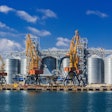
A Virgin Atlantic passenger jet powered by 100% sustainable aviation fuel (SAF) completed a London-to-New York flight on November 28, showcasing the potential of low-carbon options, which are a small fraction of the industry's fuel mix at the moment.
According to Reuters, the flight is not the first time the industry has staged demonstrations to highlight its aspiration to reduce emissions -- and appeal for government support.
Airlines are banking on fuel made from waste to reduce their emissions by up to 70%, but the high cost and tight supply of materials needed to make SAF make large-scale production difficult. SAF accounts for less than 0.1% of total global jet fuel in use today and costs three to five times as much as regular jet fuel.
Engines in commercial use are not yet certified to fly on more than 50% SAF and the vast majority of flights blend in a much lower amount of SAF with traditional jet fuel.
The fuel used to power the maiden flight is mostly made from used cooking oil and waste animal fat mixed with a small amount of synthetic aromatic kerosene made from waste corn, Virgin Atlantic said.
Corn farmers, ethanol producers turn to SAF
The rise of green jet fuel is a lifeline to corn and ethanol producers who see a shrinking market from electric vehicles. Corn ethanol makers need to find new markets quickly as 40% of the U.S.'s output of the grain is used to make the biofuel that’s blended into gasoline.
According to a report at Farm Progress, the search for new uses for ethanol represents a pivot for an industry that has been supported by the U.S. government for almost half a century as a way to curb emissions and promote energy security.
Now, with President Joe Biden endorsing electric vehicles, biofuel makers and crop traders like ADM are beginning to pursue investments in SAF.
With airlines looking to reduce emissions, the U.S. market for converting ethanol and other alcohols to jet fuel could grow to about $105 billion by 2050, according to Bloomberg. The challenge is producing ethanol for aviation fuel at a commercial scale.



















